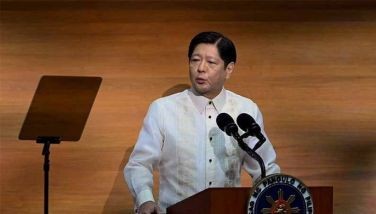Bamboo economics (2)

The Maharlika Investment Fund offers possibilities for bamboo ventures.
The MIF can be a co-investor in industrial plantations and in specific high value bamboo product processing industries that may interest foreign investors.
Maharlika seeks to reduce risk to foreign and domestic capital investment through risk-sharing.
President Marcos Jr. has four focus areas: poverty reduction, economic recovery, climate change and SMEs.
Bamboo opens pathways to all four.
Bamboo as an industry can provide significant income for the poor. Through manufacturing of bamboo products and farming in bamboo plantations.
Bamboo czar Butch Alcantara claims bamboo is a $70-billion global industry.
China accounts for half of that or $35 billion, and employs 10 million direct jobs on 4.2 million hectares.
The Philippines can plant bamboo on the 3.75 million hectares unplanted out of the country’s 9 million hectares of arable agricultural land.
A mature national bamboo industry can not only provide significant income improvement for mine and similar workers but can actually be a major factor in economic development and climate change mitigation.
Alcantara thinks a Philippine bamboo industry can contribute $3.5 billion/P192.5 billion to the economy or 1.4 percent addition to GDP and a 21 percent increase in the assumed GDP growth rate of 7 percent. Bamboo can create one million new jobs, he reckons.
Thus, a national bamboo industry can be a major contributor to economic recovery, a significant anchor in climate change mitigation and adaptation and an essential push for countryside income upliftment and social amelioration.
One of the strongest policy pronouncements by President BBM on economic recovery and growth is to focus on agriculture – to paraphrase him in 2022: “To achieve economic growth we shall emphasize responsible sustainable mining and industrial agricultural plantations.”
Butch thinks bamboo has the greatest potential for industrial agricultural plantations. From planting to processing and manufacturing of high value industrial products.
Such products include construction materials, bamboo-carbon composites for large-diameter water and sewage pipes and windmill turbine blades and, of course, wood tiles, beals, textiles.
Also, wallpaper, plywood and surprisingly – processed food products including beer, tea, canned bamboo shoots and even cosmetics.
Gushes Butch: “It’s a new industry and climate change mitigator almost equal to the entire metallurgical output of the mining industry almost equal to gold, copper and nickel production.”
He says bamboo’s impact and significance as a mitigation versus the harmful effects of climate change are not only significant but immeasurable.
Bamboo releases 38 percent more oxygen than endemic trees and captures substantial carbon emissions of 12-17 tons annually.
Bamboo is touted as renewable energy (biomass) and a replacement for fossil fuels.
Japan is eyeing bamboo pellets to replace coal – because bamboo has one of the higher calorific or heating values without the fossil fuel carbon emissions.
The technology is simple and inexpensive. Calorific heating value of bamboo pellets is 4,500 kcal/kg to 5,000 kcal/kg vs. 4,200 Kcal/kg for low grade coal up for high kcal/kg for high grade coal.
Other benefits:
• Substantial additional revenue from carbon credits.
• Planting in unutilized urban area lands for pollution control (where pollution from vehicle emissions is highest) as CSR of major companies – employment of informal settlers.
A major potential achievement of the bamboo industry is income upliftment and social amelioration, especially in the farther off rural areas and the countryside.
A study by the International Network of Bamboo and Rattan (INBAR), a 48-member country association based in Beijing, shows that a bamboo farmer with a 10-hectare plot can earn almost ¥116,000.00 or almost P1.0 million per year – 4x the salary of a comparative mine worker.
Beneficiaries would be in far-off rural populations and indigenous peoples around agricultural (plantation) communities.
Community bamboo villages in untapped natural bamboo growth areas could be immediately organized into income-producing enterprises for basic products like handicrafts and toys.
Butch says we have all the essentials to have a strong agricultural-based economy, but agriculture is only 10 percent of our national economy but has 33 percent of the labor force.
About 47 percent of the land is classified agricultural and we have 9 million hectares of arable land, of which only 5.25 million hectares is planted (4.2 million hectares to rice).
There are 3.75 million hectares available for agricultural expansion. Bamboo is highly suited to Philippine soil and climate conditions – 62 documented species/21 endemic/11 species of high economic value.
Butch says the bamboo industry work will require cooperation, synchronization and collaborative efforts from the government and the private sector, plus a strong mandate and budgetary support.
Community-based projects near- and medium-term. In the near- and medium-term, we should organize community-based projects for immediate income-producing ventures, identify areas of natural growth bamboo and organize bamboo villages. Identify, if any, LGU-controlled lands in local communities and set/support community bamboo planting projects and basic processed products and organize local bamboo (LGU) councils to lead small bamboo projects.
Butch wants government tax and other perks for bamboo growing and manufacturing.
He urges fast-tracking bamboo plantation IFMAs (integrated forest management areas) including surrounding processing plants; larger and longer tenures for IFMAs and fiscal incentives such as income tax holidays, tax-free imports of capital/processing equipment and implicit tree cutting in the IFMA areas.
* * *
Email: [email protected]
- Latest
- Trending


























